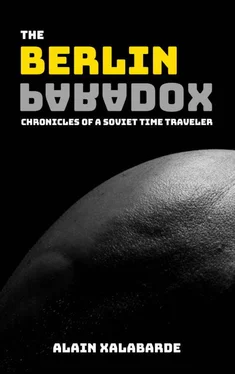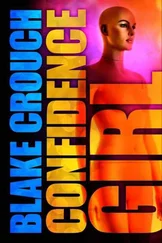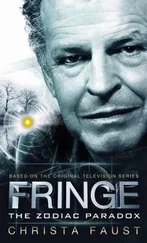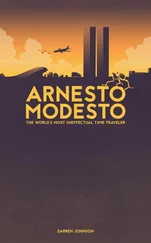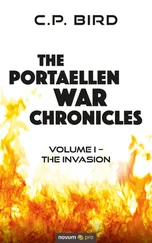I stand there, like an idiot, waiting for nothing. After a few hours of sitting on the cold floor like a beggar, I notice someone. He is a rough-looking man in his fifties. He smokes. He stares at me. He finally drops his cigarette butt and steps on it. With a determined step he paces towards me. My muscles tense up, ready to put up a fight. The man stops only a meter away from me. His eyes are glowing with a thin layer of tears. Although he is speaking in Polish, I know enough of the language to understand that my grandfather is overwhelmed to see me.
I had never met my grandfather. Never even saw a picture of him. But the way he curls up his lips after the end of every sentence reminds me of my father. I then realize I do the same exact thing when I end my own sentences. Never realized it until today.
It’s been three weeks since I moved into his home. The war is in full motion and bombs have begun to drop on Berlin. I know the worst is yet to come though. In the meanwhile, I’ve had to stay in hiding. It’s very likely that a young man like myself would be immediately drafted.
Some of my hair has grown back, and it feels good. I have met my grandfather’s comrades and I am now a full member of the Zagra-Lin, a Polish resistance organization. Some will call them freedom fighters, others may refer to them as terrorists. I’m not particularly proud of what I’ve had to do so far, but it’s the only chance I have to put an end to this.
I’ve taken the time to learn about my past. My grandfather has told me an infinity of tales regarding my father. Apparently they did not end in good terms. My father turned on his family and joined the German cause. Although my grandfather is ready to forgive, he isn’t ready to trust. That’s why I am here. If one of my father’s instances were to show up at his doorstep, he wouldn’t be able to trust him. He would consider him the man who left his family to fight Hitler’s cause. I, on the other hand, am the only person he can somewhat be certain of. I am to be trusted. I don’t quite understand the logic behind my grandfather’s reasoning, but he has proven to be wiser than I am in every other regard. So I go along with it.
Today may be the last time I see him. The last three weeks have been nothing but a long preparation for today. The plan is finally in place, the explosives have been finally acquired, and the team is ready to strike. All they were waiting for was for me to reveal the target. My orders are clear, but I am still hesitant. A lot of innocent people may be killed because of our actions, but there is no other way to access the vault unless we create a commotion at the street level.
I am ready. My cold gun pressing against my chest. I walk to the service door and stand next to it. Any minute now. Friedrichstrasse station is busy today. I wish it weren’t. I lean against the wall, tug at my trenchcoat and wait impatiently. What’s taking so long?
Then it happens.
I feel the rumble beneath my feet and a deafening bang blasts my ears. It’s louder than I expected. A cloud of smoke expands in the distance and the crowd crouches in unison, as if it were a choreographed ballet. An instant of baffled silence and then the roars and moans of terrified civilians spreads like a virus into an overwhelming commotion.
The service door opens soon after. A man walks out in a hurry. I stretch my foot to prevent it from closing and help myself inside. Although I stumble upon more than one person, nobody seems to acknowledge my presence. The explosion has done its job, and I’ve become invisible.
I make my way down a set of stairs, deeper underground into the belly of the station, until I find a large metal door. That must be it. A soldier is holding it open, guiding other soldiers, employees and scientists out of the vault. It’s going to be challenging to push through the on-coming avalanche of people in order to access the inside. I make an attempt, but I am pulled aside by the guarding soldier. He yells that I cannot enter the facility. I reach for my gun and am about to pull it out when a policeman steps in. He calls the soldier for help, and briefly points out the lack of officers keeping the crowd under control in the upper floors. I recognize the police officer’s voice. It’s my grandfather. The soldier hesitates for a brief moment but eventually leaves his post. I squeeze through the steady flow of people, as if swimming up a river, and finally make my way into the vault.
A high-pitched alarm is blaring inside the confined corridors, strenuously echoing against the hard concrete. The facility has noticeably been constructed in the same manner as the other labs, but, as in all other labs, the layout is completely different. I explore every corner as fast as I can. My father explained that what I seek is unmistakable. When I find it, I will know it. And I do.
A set of thick, metallic barn doors lead to an immense room. I feel goosebumps across my body as I find the gigantic bell-shaped structure in front of me, stoically glowing with a deep violet aura.
This is it: Kronos. The mechanism that is powering all other time booths across the city. I pull out the explosives from within my coat and wrap them around the base of the bell. I hear a man shouting behind me, demanding I tell him what I am doing. I turn around and pull out my gun. The scientist immediately rises his hands and ends his bickering. I tell him to get out. He hesitates at first, but soon follows as I sprint by him and out the door. We run up the stairs as fast as we can. The explosion sends a ball of fire and smoke up the narrow passage. I think may have timed it wrong. It shouldn’t have gone off this fast. My eyes are covered in dust and I am temporarily deaf. I keep running forward. I need to get out as soon as possible.
I reach the surface, bumping into various soldiers on the way. They seem disoriented. Not sure which explosion to follow: the one above or the recent one below. Once I reach the outside tunnel I remember the instructions my grandfather gave me. On the far end I discern the column he referred to in his descriptions. Beside it, on the ground, the manhole cover. I pull it open with ease. Someone else has already used it. I slide down and find myself in the sewers. It’s dark. My eyes have a hard time adjusting to the darkness. My ears are still blocked. But I do feel the hand that grabs me by the arm. I turn and find my grandfather. I try reading his lips, but can’t make out what he is saying. I follow him down the intricate passageways and finally reach the surface once more. Our comrades have clean clothes ready for us.
It’s over. We’ve done it. History has been changed forever, and nobody will understand how it happened or who was behind it. Nobody will remember my name and, in part, I prefer it that way.
That same night my grandfather and I drink a lot. More than I have ever drank in my life. He will be returning to Poland, and I… I don’t know yet. I have an idea, but I still need to muster the courage.
It’s been two years since I left Berlin.
I had few choices left. I couldn’t stay in Germany. If I did, I would most likely be enlisted in the army. If I were to somehow avoid that, I’d still inevitably be forced to join the Volkssturm down the line. An army made of old men, injured soldiers and boys too young to fight, in Germany’s last desperate and futile attempt to win the war. I escaped the country and felt like I was playing with an unfair advantage. I knew how history would unfold and I knew exactly what to do in order to survive the next couple of years until the end of the war.
My Polish comrades helped me cross the border towards the incoming Red Army. There I offered my services as a pilot. However, it wouldn’t be long until officials caught eye of my flawless German accent and decided that I was better suited to join URK SMERSH, the military’s field counterintelligence department. I was immediately transferred to the 3rd Ukrainian Front, under the command of Rodion Malinovsky. Having fought in World War I, the Spanish Civil War and liberating Stalingrad from the Germans, I was confident I had fallen in safe hands. He’d later be replaced by Fyodor Tolbukhin, who was no less qualified. I even had the honor of working beside notorious Soviet spy Nikolai Kuznetsov, just before his capture and execution in 1944. His death was a permanent reminder that, even though I was fighting on the winning team, I would never completely safe from death.
Читать дальше
